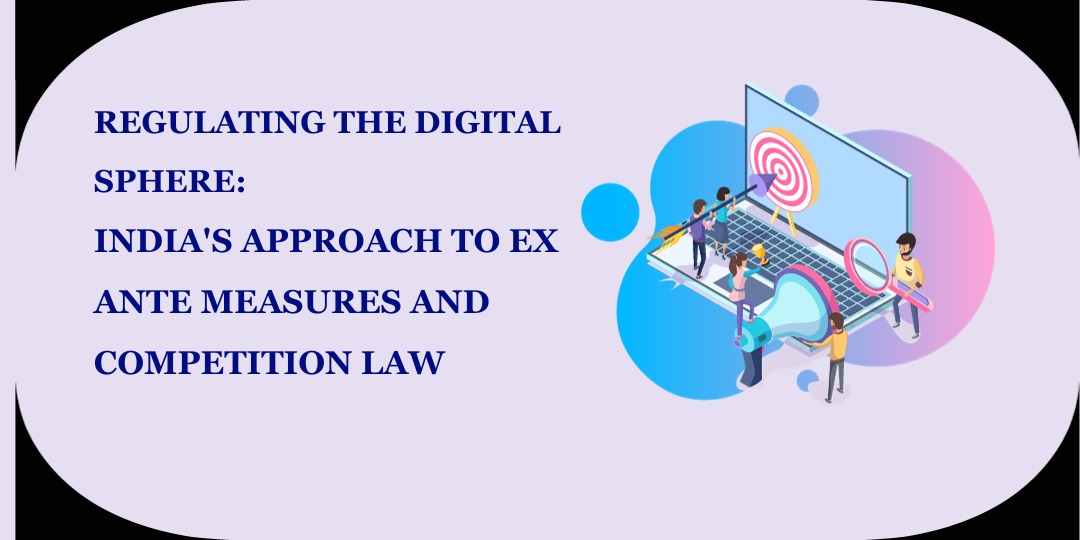Regulating the Digital Sphere: India’s Approach to Ex Ante Measures and Competition Law

Madhumitha Sridharan – Associate – Real Estate, Infrastructure & Corporate Practice
The digital economy in India has witnessed exponential growth in recent years, thanks to the widespread adoption of smartphones and increased internet connectivity. However, with growth comes challenges, including concerns related to monopolistic practices, data privacy violations, and a lack of transparency. These issues have sparked debates about the necessity of robust regulation to ensure a fair and competitive digital marketplace.
This substantial growth in the digital economy was largely attributed to a select group of major technology firms, also often categorised and referred to as the “Big Tech” companies. However, both on a global scale and within India, these companies often assume dual roles as intermediary platforms and providers of services and goods on these platforms. Consequently, concerns have arisen regarding the potential for adverse economic consequences stemming from the concentrated nature of the digital economy.
Need for special regulation
Competition regulators worldwide face growing challenges when it comes to regulating “digital markets.” This difficulty arises primarily from the significant distinctions between the functioning of digital markets and traditional ones. Many of the existing competition law principles have been developed over decades of application in conventional markets. Hence, it is evident that competition authorities are confronted with a substantial challenge since they can no longer depend solely on such existing precedents.
At the forefront of adjusting to the evolving needs of the market, the European Union introduced the Digital Markets Act (“DMA”) in 2022, and the legislation seeks to enhance competition and safety of Internet users by reducing the extensive powers that a small group of anti-competitive, large technology companies have accumulated over time. The legislation primarily focuses on major platform service providers, including social networks, search engines, web browsers, online marketplaces, messaging services, and video-sharing platforms, which boast a minimum of 45 million monthly active users within the EU.[1]
It is pertinent to note that the DMA is a prime example of an ex-ante regulatory framework in the digital realm. An ex-ante regulation is proactive, meaning it intervenes before specific issues or anti-competitive practices even arise. The DMA takes this approach by identifying specific criteria and thresholds that trigger regulatory measures for large online platforms.
In India, the situation has paralleled this trend to some extent. On the one hand, the Competition Commission of India (“CCI”) has taken active measures against Big Tech companies, launching numerous inquiries, imposing substantial fines, and mandating corrective measures in various cases based on established competition principles.
Precedents set by the CCI
In a significant development, the CCI issued an order on October 20, 2022, against Google LLC and Google India Private Limited directing Google to cease anti-competitive practices and imposing a fine of INR 1337.76 Crores. CCI’s investigation found that Google, leveraging its dominant position in the online search market, had restricted access to competing search engines. Furthermore, the commission observed that Google’s practice of mandating the pre-installation of its proprietary apps on Android devices hindered the ability of device manufacturers to offer alternate versions of Android. As a result, CCI ordered Google not to compel Original Equipment Manufacturers (OEMs) to pre-install a set of applications, cease offering incentives for exclusive use of its search services, and allow users to uninstall pre-installed Google apps. The National Company Law Appellate Tribunal (NCLAT), after considering Google’s appeal, upheld CCI’s decision on March 29, 2023, affirming Google’s perpetuation of its dominance and the resultant denial of market access to competing search applications.[2]
The CCI has also taken substantial actions against MMT-Go (MakeMyTrip and GoIbibo) and OYO for alleged anti-competitive practices. CCI imposed both monetary fines and behavioral sanctions on MMT-Go for abusing its dominant position and engaging in anti-competitive arrangements with OYO, resulting in the delisting of competitors from their online platforms in 2018. The investigation analyzed the market dynamics, emphasizing the importance of understanding interdependencies in multi-sided markets. The CCI defined the relevant market as “online intermediation services for booking hotels in India” and found MMT-Go to hold a dominant position. Notably, the CCI observed that MMT-Go’s combination of deep discounts, price parity obligations, and exclusivity conditions reinforced its dominant position, impacting competition adversely. The CCI also examined the arrangement between MMT-Go and OYO, concluding that it denied access to an important distribution channel and contravened competition law. As a result, monetary penalties and behavioral remedies were imposed on MMT-Go and OYO to address these anti-competitive practices and foster a more competitive environment.[3]
Despite such instances of effective measures taken by the CCI, doubts have still emerged regarding the actual effectiveness of these actions in achieving timely market corrections and promoting consumer welfare.
Proposed ‘Digital Competition Act’
On December 22, 2022, the report on ‘Anti-Competitive Practices by Big Tech Companies’ was presented by the Standing Committee on Finance, headed by Mr. Jayant Sinha. The report specifically highlighted that addressing harm after the fact in digital markets (i.e. an ex-post framework) is insufficient in preventing irreparable damage to affected parties.[4]
Consequently, the committee emphasized the need for a proactive ex-ante regulatory framework in the rapidly evolving digital markets. To achieve this, the committee proposed adopting an approach similar to the European Union’s DMA, by the introduction of a legislation to be known as the “Digital Competition Act”. Under this proposed framework, dominant players in digital markets, would be designated as ‘Systematically Important Digital Intermediaries’ (“SIDI”). Once designated as a SIDI, the committee recommended that these entities be required to submit annual compliance reports to the Competition Commission of India (CCI) outlining the steps taken to adhere to mandatory ex-ante obligations.
Pushback
While the exact ex-ante measures are yet to be established, as with any significant legislative proposal, the proposed Indian Digital Competition Act has faced its share of pushback and criticism from various quarters. Several representations have been made by organisations standing in support of Big Tech companies, and industry analysts have raised concerns about the potential negative impact of ex-ante regulatory proposals.[5]
These proposals, which involve restrictions on entities which would be categorised as SIDIs and bans on bundling and adjacent market entry, are viewed as potentially hampering the innovation efforts of large online platforms. Some argue that these measures, do not adequately consider the innovation dynamics that arise when creating and advancing new services. To address these concerns, a more comprehensive approach to understanding competition in the digital age is recommended. Rather than solely categorizing businesses based on digital or non-digital channels, it is essential to focus on the product market and the broader competitive landscape. This approach takes into account the complexities and nuances of the digital market and ensures that regulations strike a balance between competition and innovation.
The introduction of an ex ante digital competition law in India is also premature, considering the recent developments in the regulatory landscape. The Competition Amendment Act, 2023 provides the CCI with enhanced powers to address digital market dynamics, including addressing issues related to anti-competitive agreements and abuse of dominance.[6] Additionally, the Digital Personal Data Protection Act, which has also received presidential assent, focuses on safeguarding data privacy in the digital space.[7] These two legislative actions indicate that India is already taking significant steps to regulate and address challenges in the digital economy. Implementing an ex ante digital competition law at this juncture could lead to regulatory overlaps, confusion, and potential contradictions between these newly enacted laws and the proposed ex ante measures, making it crucial to carefully assess the need for additional legislation to ensure a coherent and effective regulatory framework for the digital sector.
As has been illustrated above, the CCI has been empowered enough to take suo moto cognisance of anti-competitive behaviour and issue corrective action, and even order interim relief like it did in the case of MakeMyTrip and GoIbibo. If the concern is more about competence and speedy rendering of justice, establishing specialized units within the CCI dedicated to addressing issues in the digital market can enhance the commission’s ability to comprehend and regulate these complexities effectively. Bangalore, often referred to as the Silicon Valley of India, could be an apt choice for hosting such a specialized unit for starters. Having such specialised digital market units would enable the CCI to tap into local expertise, foster collaboration with industry stakeholders, and stay at the forefront of regulatory developments in the digital space, ensuring effective oversight and enforcement in this critical sector.
Conclusion:
India’s proposed Digital Competition Act represents a commendable effort to address the challenges posed by the digital economy. However, striking the right balance between regulation and innovation is essential to ensure that the country continues to thrive in the global tech landscape. While ex ante measures are necessary to prevent anti-competitive behavior and protect consumers, policymakers must be cautious not to inadvertently stifle the spirit of innovation that has driven India’s tech sector’s growth. A dynamic and adaptable regulatory framework that fosters innovation while addressing pressing concerns is the path forward for India’s digital future.
[1] About the Digital Markets Act, European Commission, https://digital-markets-act.ec.europa.eu/about-dma_en (last visited on 10 Oct, 2023)
[2] Google LLC and Another v. Competition Commission of India Through its Secretary and Others, 2023 SCC OnLine NCLAT 147
[3] Federation of Hotel & Restaurant Associations of India v. MakeMyTrip India Pvt. Ltd., 2022 SCC OnLine CCI 58
[4] Anti-Competitive Practices by Big Tech Companies, Standing Committee Report Summary, https://prsindia.org/policy/report-summaries/anti-competitive-practices-by-big-tech-companies#:~:text=The%20Committee%20recommended%20that%20the,competing%20on%20the%20same%20platform. (last visited on 10 Oct, 2023)
[5] Dia Rekhi & Surabhi Agarwal, Group of organisations write to MCA over concerns around impact of Digital Competition Bill, https://economictimes.indiatimes.com/tech/technology/group-of-organisations-write-to-mca-over-concerns-around-digital-competition-bill/articleshow/101273498.cms?from=mdr (last visited on 10 Oct, 2023)
[6] The Competition (Amendment) Act, No. 9 of 2023
[7] The Digital Personal Data Protection Act, No. 22 of 2023



